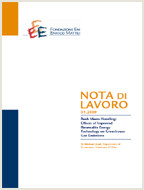How CO2 Capture and Storage Can Mitigate Carbon Leakage

15.01.2011
Philippe Quirion, Julie Rozenberg, Olivier Sassi, Adrien Vogt-Schilb
Q5, Q58
CO2 Capture and Storage, Carbon Leakage
Climate Change and Sustainable Development
Carlo Carraro
Most CO2 abatement policies reduce the demand for fossil fuels and therefore their price in international markets. If these policies are not global, this price decrease raises emissions in countries without CO2 abatement policies, generating “carbon leakage”. On the other hand, if the countries which abate CO2 emissions are net fossil fuel importers, they benefit from this price decrease, which reduces the abatement cost. In contrast, CO2 capture and storage (CCS) does not reduce fossil fuel demand, therefore it generates neither this type of leakage nor this negative feedback on abatement costs. We quantify these effects with the global hybrid general equilibrium model Imaclim-R and show that they are quantitatively important. Indeed, for a given unilateral abatement in OECD countries, leakage is more than halved in a scenario with CCS included among the abatement options, compared to a scenario prohibiting CCS. We show that the main reason for this difference in leakage is the above-mentioned international fossil fuel price feedback. This article does not intend to assess the desirability of CCS, which has many other pros and cons. It just identifies a consequence of CCS that should be taken into account, together with many others, when deciding to what extent CCS should be developed.
